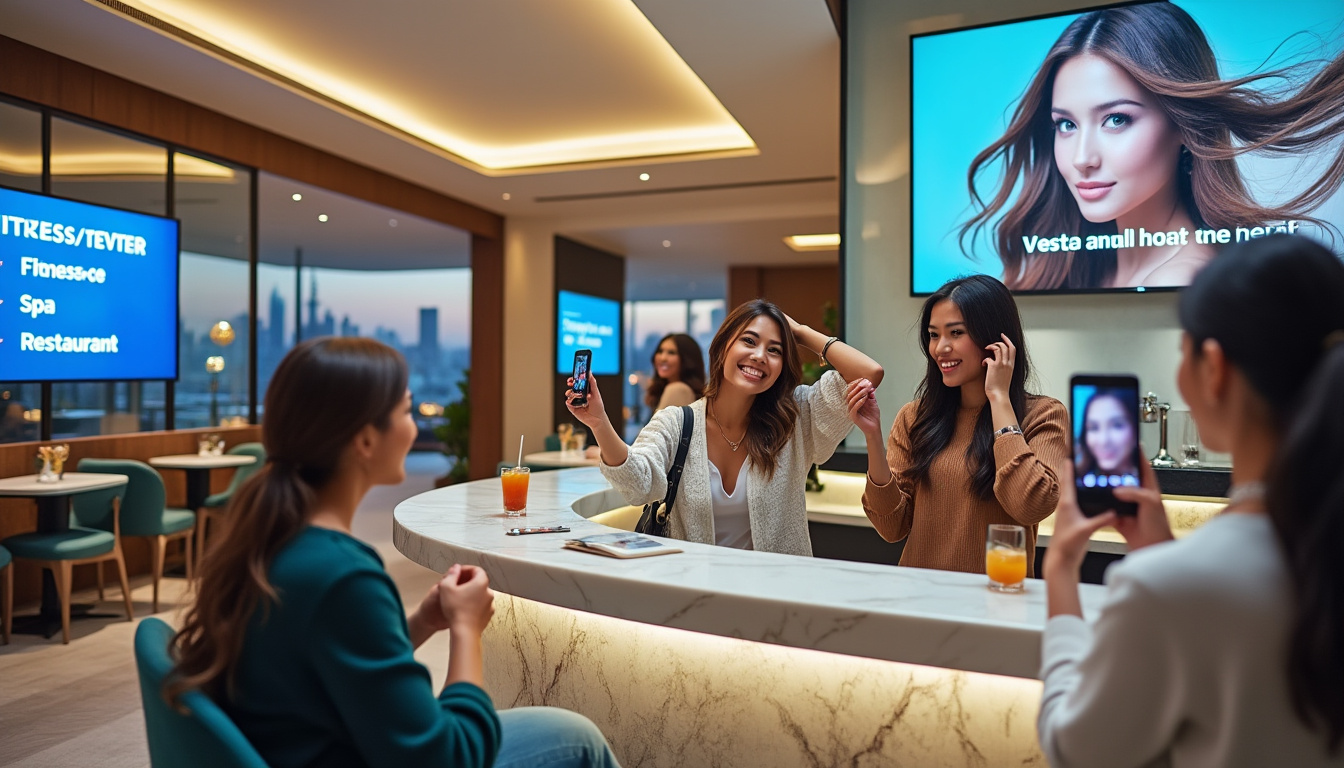The hospitality industry is undergoing a seismic shift, driven by emerging technologies and increasingly discerning consumer behavior. Particularly, the advent of social commerce has drastically reshaped the ways in which hotels connect with potential guests. As platforms like TikTok introduce innovative features such as in-app bookings, hospitality brands are compelled to navigate this new landscape with deftness and creativity. This exploration sheds light on how social commerce is poised to redefine the future of the hospitality sector.
Transforming Guest Engagement through Social Commerce
Social commerce merges discovery, social interaction, and transaction, enabling a seamless experience that dramatically changes how hotels engage with potential guests. Traditionally, visitors would browse hotel listings on platforms such as Booking.com or Expedia. However, the integration of booking functionalities into social media platforms, particularly with the launch of TikTok Go, is revolutionizing this process.

The Emergence of TikTok Go and Its Impact
The partnership between TikTok and Booking.com has ushered in a new era for hospitality. TikTok Go allows users to browse and book hotels directly within the app, capitalizing on the platform’s massive user base, which has surpassed 1 billion monthly active users. This represents a significant opportunity for hotels looking to engage with a younger and increasingly tech-savvy demographic.
This is not merely another marketing avenue; TikTok Go exemplifies the future of hospitality distribution. It provides properties exposure within a global storytelling engine, powered by TikTok’s sophisticated algorithm. However, the partnership also carries inherent risks, as every transaction processes through Booking.com, which maintains the standard commission structure hotels are accustomed to.
Challenges of Embracing New Platforms
While the introduction of TikTok Go brings numerous advantages, hotels must also contend with the challenges presented by this new distribution model. One significant issue is margin pressure; since hotels still need to pay the same commission as they do with OTAs, this can affect profitability if not managed correctly.
- Margin Pressure: High adoption rates without a clear conversion strategy could jeopardize profitability.
- Brand Representation Risks: Hotels are reliant on content creators to portray their offerings accurately.
- Audience Fit: Not all TikTok users are potential guests, which may lead to ineffective marketing.
Maximizing Opportunities in Social Commerce
The advent of social commerce, especially via platforms like TikTok, offers numerous opportunities for hotels to enhance their marketing strategies. In particular, storytelling and user-generated content can dramatically elevate a hotel’s visibility and appeal.
Harnessing the Power of Storytelling
Through compelling and engaging video content, hotels can showcase their unique services, ambiance, and location. TikTok allows hotels to convey messages that resonate emotionally with viewers. Examples include showcasing a stunning sunset view from a hotel room or a behind-the-scenes look at operations. Such storytelling can lead to considerable customer engagement.
Furthermore, leveraging trending sounds and hashtags can amplify the chances of content going viral, putting hotels in front of millions without direct advertising costs. This positions hotels to maximize their marketing reach while minimizing expenses.

Creating Connections Beyond Booking
Once a guest has booked through TikTok Go, the real challenge lies in converting that transient relationship into a loyal customer base. This can be achieved by implementing personalized communication and engagement tactics. For instance, hotels can issue QR-coded welcome cards that link guests to loyalty programs or exclusive offers for future direct bookings.
By viewing TikTok Go bookings as the beginning of a journey, rather than an end in themselves, hotels can cultivate long-term relationships with guests. Following up with personalized emails or social media engagement can greatly enhance guest satisfaction and drive repeat business.
The Risks of Social Engagement and Brand Management
In the rapidly evolving landscape of social commerce, managing brand reputation becomes an increasingly intricate endeavor. User-generated content can spread rapidly and often outside a hotel’s control, which poses both opportunities and risks for hospitality brands.
Navigating the User-Generated Content Landscape
While user-generated content enables organic visibility, it also risks misrepresentation of the hotel experience. An unfavorable portrayal by an influencer could carry negative repercussions. To mitigate this risk, establishing brand guidelines that influencers and creators must adhere to is crucial. Proactively engaging with positive mentions and correcting misinformation can also help maintain a consistent brand image.
- Engage with Positive Mentions: Actively responding to positive TikTok content can amplify good impressions.
- Monitor Content: Regular audits of brand portrayal can prevent detrimental mischaracterizations.
- Collaboration with Creators: Establish guidelines and mutual benefits for content partnerships.
The Balancing Act of Authenticity and Control
Hotel brands must strive to find a balance between authenticity and control. On one hand, embracing spontaneity in user-generated content can humanize a brand and foster trust among potential guests. On the other hand, a hotel must protect its reputation and ensure that key messaging remains intact.
Developing collaborative partnerships with social media influencers can allow hotels to align their narrative while retaining some level of creative control. This dual approach can enhance brand authenticity and protect interests.
Measuring Success in the Age of Social Commerce
In the realm of social commerce, effective measurement will be key to determining the success of any new strategy. As TikTok Go introduces a different order to the guest journey, the metrics for evaluating success must evolve correspondingly.
Key Performance Indicators (KPIs) in Social Commerce
To ensure strategic alignment with business goals, using key performance indicators tailored for social commerce is essential. Metrics should extend beyond traditional methods to include factors that assess content performance and engagement rates.
- Engagement Rate: Measures the interaction levels with TikTok content (likes, shares, comments).
- Conversion Rate: Tracks how many TikTok users proceed to book following exposure to content.
- Customer Lifetime Value: Calculates profitability from guests acquired through social media versus traditional channels.
Assessing the Effectiveness of Cost Structures
It’s not enough to know how social platforms increase visibility; hotels must also analyze cost comparisons. This includes measuring return on investment (ROI) compared to other marketing avenues. Implementing tracking mechanisms to assess how many TikTok-generated bookings convert into returning guests can inform future strategies.
| KPI | Method of Analysis | Target Value |
|---|---|---|
| Engagement Rate | Likes, comments, shares | Above 15% |
| Conversion Rate | Booked reservations via TikTok | At least 5% |
| Customer Lifetime Value | Revenue per guest from social bookings | Increase by 20% |
Cultivating a Sustainable Future in Hospitality through Social Commerce
As the integration of social commerce continues to shape the hospitality landscape, brands must commit to a thoughtful approach, balancing creativity with control. In an increasingly digital world, hospitality businesses stand to gain significantly if they invest in storytelling, engage with users ethically, and adopt effective tracking measures.
Leveraging Future Trends
With new technologies continually emerging, it becomes vital for hotels to remain adaptable. Social media platforms evolve rapidly, and the features available today may shift in the coming years. By keeping a pulse on industry trends, hospitality brands can prepare for potential challenges while capitalizing on unpredictable opportunities.
Moreover, collaboration across platforms such as Airbnb, IHG, Hyatt, Marriott, and Hilton, using shared knowledge and strategies, can shape a more sustainable future in hospitality. By embracing these experiences and investing in proactive strategies, hotels will solidify their presence and successfully navigate this new era of social commerce.
